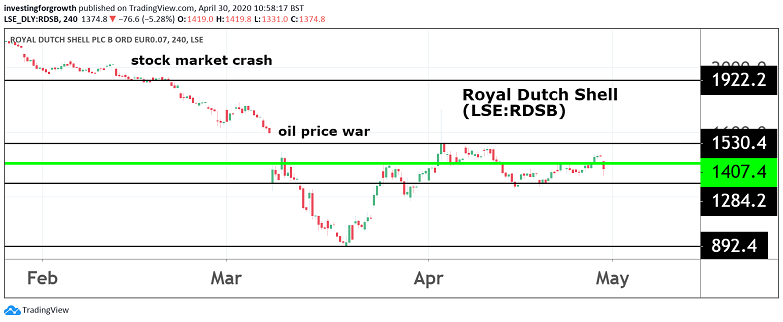Royal Dutch Shell deals massive blow to income investors
Our head of markets explains the significance of a first dividend cut since the Second World War.
30th April 2020 11:15
by Richard Hunter from interactive investor
Our head of markets explains the significance of a first dividend cut since the Second World War.

The reduction of the dividend will inevitably grab the headlines, but Royal Dutch Shell (LSE:RDSB) brave decision reflects a desire to hunker down and protect the business in the wake of a worsening global economic outlook and a highly unstable oil price.
Of course, the reduced dividend to 16 US cents per share from a previous level of 47 cents, itself unchanged since 2014, will be a blow to income-seeking investors and existing shareholders.
Chairman Chad Holliday explained
“…given the risk of a prolonged period of economic uncertainty, weaker commodity prices, higher volatility and uncertain demand outlook, the board believes that maintaining the current level of shareholder distributions is not prudent.”
The shares will begin trading without the right to the latest dividend on 14 May and pay out on 22 June. Shareholders will be told the sterling equivalent on 8 June.
- A checklist for finding dividend shares in a crisis
- Nine in 10 UK shares have cancelled or suspended dividend payments
- Take control of your retirement planning with our award-winning, low-cost Self-Invested Personal Pension (SIPP)
However, the decision can be seen as a positive on two levels.
Firstly, the move is financially prudent (and understandable, given a 28% fall in revenues and a 46% drop in replacement profit), while at the same time the dividend is now at a level which the company believes to be sustainable in the future.
Secondly, even at the lower revised figure, the implied dividend yield of around 3.5% (compared to the current 10%) is still likely to exceed the FTSE 100 index average due to dividend cuts elsewhere.
In addition, the rebasing of the dividend should free up some $9 billion over the next year. At the same time, Shell is looking to reduce operational and capital expenditure by a similar amount, while expected divestments will add further grist to the financial mill, all of which will create a war chest running to nearly $30 billion.
This capital cushion is vital in the current environment, where oil in particular is in a parlous state. A toxic combination of demand destruction, with aircraft standing idle, vastly reduced travel generally and manufacturing shutdowns, alongside the issue of oversupply, to the extent that even storage of physical oil is becoming more difficult as storage space is increasingly taken, have put the oil majors on red alert.

Source: TradingView Past performance is not a guide to future performance
More positively, Shell’s record over the last few turbulent years – including a profit warning at the end of 2019 - has been one of financial housekeeping on a truly industrial scale. Its current gearing level of 29% is above its long-term target of 25%, but nonetheless compares favourably with BP, where the figure is 36%.
Furthermore, this ability to streamline operations with agility and speed strengthens what is already a strong investment proposition.
- Chart of the week: FTSE 100 could do something spectacular very soon
- Is Shell’s share price rally on borrowed time?
- Oil sector share tips: bargains and dividends after the crash
The disappointment of the dividend decision has clearly manifested itself in the share price reaction, which adds to a 46% decline over the last year, as compared to a dip of 18% for the wider FTSE 100.
In relatively dark days such as these, investors will take some comfort from the fact that, even in this environment, Shell is still profitable and is paying a dividend. Some of the sheen may have been lost from the company’s relatively bombproof reputation as a core portfolio constituent, but the market consensus of the shares as a “buy for the longer term” should remain unaffected.
Full performance can be found on the company or index summary page on the interactive investor website. Simply click on the company's or index name highlighted in the article.
These articles are provided for information purposes only. Occasionally, an opinion about whether to buy or sell a specific investment may be provided by third parties. The content is not intended to be a personal recommendation to buy or sell any financial instrument or product, or to adopt any investment strategy as it is not provided based on an assessment of your investing knowledge and experience, your financial situation or your investment objectives. The value of your investments, and the income derived from them, may go down as well as up. You may not get back all the money that you invest. The investments referred to in this article may not be suitable for all investors, and if in doubt, an investor should seek advice from a qualified investment adviser.
Full performance can be found on the company or index summary page on the interactive investor website. Simply click on the company's or index name highlighted in the article.